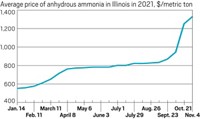Advertisement
Grab your lab coat. Let's get started
Welcome!
Welcome!
Create an account below to get 6 C&EN articles per month, receive newsletters and more - all free.
It seems this is your first time logging in online. Please enter the following information to continue.
As an ACS member you automatically get access to this site. All we need is few more details to create your reading experience.
Not you? Sign in with a different account.
Not you? Sign in with a different account.
ERROR 1
ERROR 1
ERROR 2
ERROR 2
ERROR 2
ERROR 2
ERROR 2
Password and Confirm password must match.
If you have an ACS member number, please enter it here so we can link this account to your membership. (optional)
ERROR 2
ACS values your privacy. By submitting your information, you are gaining access to C&EN and subscribing to our weekly newsletter. We use the information you provide to make your reading experience better, and we will never sell your data to third party members.
Business
Fluoride Shortfall
Fertilizer plant closure puts nationwide crimp on fluoridation
by Michael McCoy
October 3, 2005
| A version of this story appeared in
Volume 83, Issue 40
The ongoing shutdown of a phosphate fertilizer plant in Florida has led to a sharp drop in supplies of a key water fluoridation chemical and to spot fluoride shortages in towns and cities across the U.S.
The Fort Meade, Fla., facility, operated by U.S. Agri-Chemicals, makes hydrofluosilicic acid (H2SiF6, HFS) as a by-product of the conversion of phosphate ore into finished fertilizer. With the plant winding down operations, some 15% of U.S. HFS capacity is coming off the market.
The Centers for Disease Control & Prevention has warned of an emerging shortage that "will be experienced throughout the water industry." The pinch has been most severe in New England where, for example, the town of Shrewsbury, Mass., ran out of HFS in mid-September.
Compounding the supply situation, demand for HFS is spiking in California as a result of the intended start of fluoridation in some communities. Unable to procure adequate supplies, the San Francisco Public Utilities Commission has delayed until late fall plans to treat the remaining 20% of its customer base.
HFS suppliers are scrambling to meet demand in the face of the supply shortfall. "Customers depending on product from U.S. Agri-Chemicals are having to find alternative sources of supply," says Mark Looney, vice president of sales and marketing at Solvay Fluorides. Fortunately, Looney adds, water consumption is entering a seasonal slow period, and he sees supply dislocations ending soon. Shrewsbury, in fact, found new supplies late last month.
Long-term relief will depend on increased output from Mosaic and PCS Phosphates, fertilizer makers that are the country's largest HFS makers. A Mosaic representative says the company is doing all it can to adjust its HFS supply capability. David Messerlie, CEO of fluorides marketer LCI, is confident that fertilizer companies will be able to squeeze out more HFS. "Things are working themselves out," he says.







Join the conversation
Contact the reporter
Submit a Letter to the Editor for publication
Engage with us on Twitter